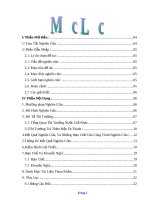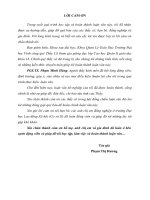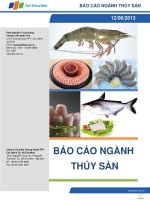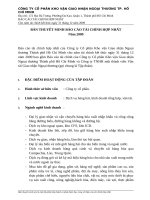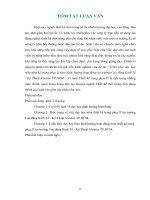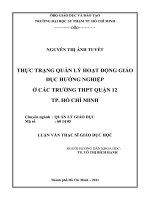Lecture Drama II - Modern drama: Lecture 12 - Dr Irum Zulfiqar - Trường Đại học Công nghiệp Thực phẩm Tp. Hồ Chí Minh
Bạn đang xem bản rút gọn của tài liệu. Xem và tải ngay bản đầy đủ của tài liệu tại đây (337.24 KB, 20 trang )
<span class='text_page_counter'>(1)</span><div class='page_container' data-page=1>
DRAMA II
Modern Drama
Lecture 12
</div>
<span class='text_page_counter'>(2)</span><div class='page_container' data-page=2>
SYNOPSIS
O’Casey ‘s Works are a representation of
contemporary influences: <i><sub>Nothingness</sub></i>,
<i>Hollowness and Purposelessness</i>
<i>Irish Civil War: Jingoism</i>
How it <i>effects the society and</i> <i>the individuals</i>,
How it <i>crushes the economy and the system</i>,
How it <i>disintegrates the family structure</i>,
how it <i>demolishes the psychology of the people</i>
and how it <i><sub>creates generation gap</sub></i>
How this influence results in <i><sub>Nothingness</sub></i>,
</div>
<span class='text_page_counter'>(3)</span><div class='page_container' data-page=3>
Sean O’Casey was <i><sub>born in 1818</sub></i> and <i><sub>died in </sub></i>
<i>1964</i>. The play has been written on the
<i>background of Irish Civil War</i>, which has been
going for centuries.
</div>
<span class='text_page_counter'>(4)</span><div class='page_container' data-page=4>
Irish Civil War
Juno and the Paycock: Jingois
</div>
<span class='text_page_counter'>(5)</span><div class='page_container' data-page=5>
Jingoism
flag wavin
g
“an appea
l
intended
to
arouse
</div>
<span class='text_page_counter'>(6)</span><div class='page_container' data-page=6>
Jingoism (Denotation)
</div>
<span class='text_page_counter'>(7)</span><div class='page_container' data-page=7>
Jingoism is extreme patriotism in the form
of aggressive foreign policy. In practice,
it is a country's advocacy of the use of
threats or actual force against other
countries in order to safeguard what it
perceives as its national interests.
Colloquially, it refers to excessive bias in
judging one's own country as superior to
others—an extreme type of nationalism.
The term originated in Britain,
expressing a pugnacious attitude toward
Russia in the 1870s, and appeared in the
American press by 1893
</div>
<span class='text_page_counter'>(8)</span><div class='page_container' data-page=8></div>
<span class='text_page_counter'>(9)</span><div class='page_container' data-page=9>
WWI – Irish War
Main Ireland got independence after the
<i>First World War</i>
Ireland is divided into Southern and
Northern Ireland.
<i>Northern Ireland is now called Ulster</i>. The
people of main Ireland are Roman
Catholic. The majority of Ulster is
Anglican. So there is political and
religious problem.
(i)Either to unite with main Ireland
OR
(ii)To unite with England
OR
(iii)To be total independent was the main
problem or enigma.
</div>
<span class='text_page_counter'>(10)</span><div class='page_container' data-page=10>
“Juno and the Paycock”
<i> War at its background </i>(like O’Casey’s other
plays)
O’Casey is very much against the war
fought under any pretext. He closely
observed
how war <i>affects the society and</i> <i>the individuals</i>,
how war <i>crushes the economy and the system</i>,
how war <i>disintegrates the family structure</i>,
how it <i>demolishes the psychology of the people</i>
and how it <i><sub>creates generation gap</sub></i>.
</div>
<span class='text_page_counter'>(11)</span><div class='page_container' data-page=11>
O’Casy’s Position
Thus O’Casey condemns…
</div>
<span class='text_page_counter'>(12)</span><div class='page_container' data-page=12>
Social Unjust, Inequality
Violence
The play begins with Mary’s reading a
newspaper. The very first information we
get form the play is of a gruesome
murder.
“On a little byeroad, out beyant Finglas, he was
found.”
</div>
<span class='text_page_counter'>(13)</span><div class='page_container' data-page=13>
Social Unjust, Inequality
Violence
O’Casey evidently has sympathies for
the poverty stricken and war ridden Irish
society. There is nothing predicable in
Ireland. Everyone is in extreme danger.
They are hanging between life and death.
</div>
<span class='text_page_counter'>(14)</span><div class='page_container' data-page=14>
Social Unjust, Inequality
Violence
Brutality: Foreign to Irishmen
There are lots of references in the playregarding <i><sub>Ireland‘s religious</sub></i> and <i><sub>political </sub></i>
<i>history</i>.
Irish makes many attempts to shake off
the foreign yoke. Foreigners are very
<i>inhuman</i> to them. In 1916, hundred of
<i>casualties and the execution</i> of the leaders
are faultless examples of that.
</div>
<span class='text_page_counter'>(15)</span><div class='page_container' data-page=15>
Social Unjust, Inequality
Violence
<i>Inhumanity: Irishman to </i>
<i>Irishman</i>
But this inhumanity is not just caused by
foreigners. The real problem arises with
the killing <i><sub>of Irishman by Irishman</sub></i>.
War, or to be more exact, <i>a civil war</i> has
no solution to man’s problem; rather it
aggravates the miseries of victims. The
civil war is not confined to two fractions
rather it expands to the whole Ireland.
The <i><sub>death of Robbie Tancred and Johnny Boyle</sub></i>
are perfect examples of that.
</div>
<span class='text_page_counter'>(16)</span><div class='page_container' data-page=16>
Social Unjust, Inequality
Violence
Johnny, who has <i>lost an arm and has a hip </i>
<i>shattered in a fight</i>, is at the end dragged
away and shot by his former republican
commanders because he <i><sub>betrayed comrade </sub></i>
<i>Tancred</i>.
All this shows that Ireland is preying on
herself. Earlier Johnny had undoubtedly
behaved heroically but the <i><sub>hellish civil war</sub></i>
compelled him to betray his comrade.
This means the stupid civil war is turning
into traitors because of its <i><sub>nothingness</sub></i> and
<i>hollowness purposelessness</i>.
</div>
<span class='text_page_counter'>(17)</span><div class='page_container' data-page=17>
Social Unjust, Inequality Violence
Mirrorism: Inhumanity vs.
Humanity
Juno emerges as a great <i>humanist</i> and
<i>realist</i>.
She is a <i>true pacifist</i> and is <i>against man’s </i>
<i>inhumanity against man</i>.
She has an acute <i>observation</i> and knows
about the <i><sub>truth of things</sub></i>.
She is very <i>realist</i> and <i>antiidealist</i>. When
Mary emphasizes that one ought to
stand by one’s principle being <sub>“a </sub>
</div>
<span class='text_page_counter'>(18)</span><div class='page_container' data-page=18>
Social Unjust, Inequality
Violence
Being a realist, she has a firm belief in
the idea that the fault does not lie with
the stars but with the people
themselves. She says:
“Ah, what can God do agen the’ stupidity o’
men!”
</div>
<span class='text_page_counter'>(19)</span><div class='page_container' data-page=19>
Social Unjust, Inequality
Violence
The <i>domestic tragedy</i>, which mainly springs
out form <i><sub>pregnancy</sub></i>, <i><sub>is due to the inhumanity of </sub></i>
<i>the</i> <i>male.</i>
That male chauvinist society cannot
tolerate a mistake by a young girl.
Whereas on the other hand the <i><sub>idiots like </sub></i>
<i>captain Boyle and Joxer Daly</i> are left
unaccountable.
<i>Hope for a good time </i>is only due to the
<i>courage of women</i>. They are very <i><sub>humane and </sub></i>
<i>cooperative</i>.
O’Casy’s criticism of life is conveyed
through the <i><sub>repetition of significance of deep </sub></i>
<i>dialogues.</i> The words of Mrs. Tancred
lamentation are pungently recorded by
Juno, when she too, is mourning over a
slain son.
</div>
<span class='text_page_counter'>(20)</span><div class='page_container' data-page=20>
Social Unjust, Inequality
Violence
“Sacred Heart of the Crucified Jesus, take away
our hearts o’ stone……..an’ give us
hearts o’ flesh! ……..Take away this
murdherin’ hate … an’ give us Thine own
eternal love!”
Against the <i><sub>vanity and moral bankruptcy</sub></i> of
masculine character, O’Casey elevates
the mother figure when Juno plans to
work for Mary and her unborn child. Juno
suffers the <i><sub>pain of existence</sub></i> <i><sub>but she sustains </sub></i>
</div>
<!--links-->
<a href=' /><a href=' /><a href=' /><a href=' /> Sinh Viên trường Đại Học Công Nghiệp TP.HCM với sự lựa chọn Trà Thảo mộc Dr.Thanh Trong thời gian gần đây
- 24
- 756
- 0
